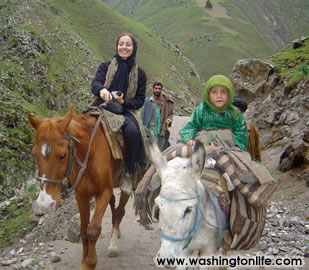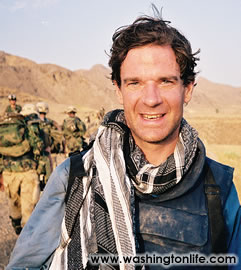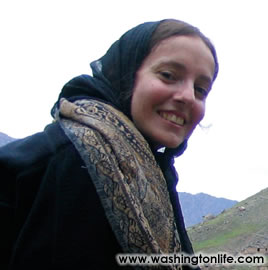Osama bin Where?
Conversation with correspondents N.C. AIZENMAN and PETER BERGEN
Photo by Scott Wallace
Four years before 9/11, CNN terrorism
analyst Peter Bergen gained firsthand
insight into the threat Osama Bin
Laden posed to the United States when he produced
the first television interview with the
elusive al-Qaeda leader. Bergen’s first book,“Holy War, Inc.: Inside the Secret World of Bin
Laden,” published just after the 2001 attacks,
was reviewed by The Washington Post as “the
only book you need to read about Osama bin
Laden.” In January, Bergen will release “The
Osama bin Laden I Know: An Oral History
of al-Qaeda’s Leader.” Bergen often crossed
paths with The Washington Post reporter N.C.
Aizenman, who has just concluded a year-long
tour as the paper’s Afghanistan Correspondent
With Aizenman back in Washington, the two
longtime friends recently met to discuss what
Bergen uncovered about a man who remains as
mysterious as he is dangerous.
N.C. Aizenman: So Peter,
why did you decide to
write this book now?
Peter Bergen: Lately
the attention has drifted
away from Osama bin
Laden and it is important
to bring it back.
Justice for the victims
of 9/11 demands it.
But bin Laden also
continues to influence
events. His statements— including specific instructions to his
followers—continue to be shared around the
world. An example of his enduring importance
is Abu Musab Zarqawi, the main insurgent leader
in Iraq, who is now saying he is part of al-Qaeda.
The attacks in Madrid in 2004 and London last
summer are also direct results of things bin Laden
has said about attacking members of the coalition
that were in Iraq. The notion that he has
been sidelined is ludicrous. Every time he comes
out with a tape it is broadcast on every network
around the world. Hundreds of millions of people
hear these messages. So, I thought it was important
to bring the focus back on this guy who founded
al-Qaeda and to get a better handle on who he
is. There was not a lot of information out there
about him.
NCA: Instead of writing a biography of bin Laden,
you have woven together first person accounts from
a wide array of people who knew bin Laden personally
to create an oral history. Why did you
choose to present the material this way?
PB: A tsunami of nonsense has been written
about bin Laden. Rather than relying on secondhand
accounts, I thought people should be given
the chance to form their own conclusions based
on firsthand accounts from bin Laden’s brothers,
his high school buddies, his university classmates
and his companions in arms. There were
two guiding principles to the book: The first was
that we only hear from people who know bin
Laden personally. The second was that we hear
from them directly—with a little bit of setting up
from me, of course—but basically in their own
words. I was influenced by a book about Edie
Sedgwick, a 1960’s supermodel who became a
sort of Andy Warhol superstar. The book was by
George Plimpton and edited by Jean Stein, and it
always struck me as a very good account of what
was going on in New York in the ’60s. Obviously
bin Laden and al-Qaeda are a rather more
serious and more complicated subject. However,
I thought that using direct testimony from people
who know bin Laden is perhaps a way of similarly
recapturing some worlds that most people
don’t have much experience in.
NCA: What are some of those worlds?
PB: Well, there’s the rarefied atmosphere of Saudi
Arabia in the 1970s, where bin Laden grew up as
a member of an educated elite. There’s Peshawar,
Pakistan, in the 1980s, a sort of South Asian Casablanca
[where] bin Laden and other Arab supporters
were funneling money and weapons across the
border into Afghanistan to the Afghans fighting
the Soviet Union. Then there’s the world inside
al-Qaeda itself. Hearing directly from the people
involved gives you a real sense of what people
were saying to one another and what people were
thinking. What was it like, for instance, for bin
Laden, who ultimately took up arms himself, to
personally fight the Soviet Union? I think you
get a sense of that. You also get a sense of the
places where bin Laden spent time. I’m speaking,
of course, of bin Laden’s house in Kabul— which Peter Jouvenal, the British cameraman and
journalist who interviewed bin Laden with me
in March of 1997, took over after the fall of the
Taliban and turned into a guesthouse.
NCA: That’s where I lived for nine months. It’s
a rather pretty, sprawling house with a large
garden near the base of one of the low mountains
looming over Kabul
PB: Did you sleep in the bin Laden memorial
bedroom?
NCA: (Laughs) I don’t think we ever established
which one was his.
PB: It would have been one of the rooms with
a bigger bed since he is 6’ 5”.
NCA: You have stayed there as well, I know. But
you also traveled to a lot of other places to gather
material for the book. What were some of the
discoveries you made?
PB: I tried to go everywhere that bin
Laden went. The only place I couldn’t get
into was Sudan. In Jeddah, Saudi Arabia,
I found that despite his family’s wealth,
the neighborhood where bin Laden
grew up was actually more of a middleclass
place. He did not live in one of
the mansions that many of the nouveau
riche have built. It gives you a flavor of
the guy. I also walked around the Tora
Bora mountains on the Afghan-Pakistani
border where bin Laden had a camp for
many years and through which he fled
Afghanistan after the U.S.-led invasion.
The camp was a sort of back-to-nature
set up—growing your own crops in the
mountain at 10,000 feet. Like a hippie
commune, except of course, different.
Certainly, one of the things I think the
book establishes is the fact, pretty much without a
doubt, that bin Laden escaped through Tora Bora,
despite what members of the Bush Administration
said in the run-up to the election. I have bin
Laden telling us what happened in the battle at
Tora Bora from his own perspective.
NCA: You also quote from various original documents— including the minutes of the meeting at
which al-Qaeda was founded. What do those
documents reveal?
PB: Well, we can now date al-Qaeda’s founding
to a certain weekend in August of 1988 when
these guys got together. They started work on
September 10, 1988, and only thirteen years later
they managed the 9/11 attacks.
NCA: One of the most intriguing sources you
found is “Jihad” magazine, a monthly published
for several years by the Services Office, the group
that was the precursor to al-Qaeda. How did you
obtain those back issues and what do they add to
the picture of bin Laden and al-Qaeda?
PB: Jihad was sort of the in-flight magazine of the
Services Office, which bin Laden set up in the
mid-1980s. I found the copies in Kabul, ironically
enough through the man who was profiled in the
well known book, “The Bookseller of Kabul.” As
readers of that account will know, the bookseller
acted heroically under the Taliban—hiding scores
of books to prevent them from being destroyed.
But he also treated his family very poorly, especially
his first wife. Anyway, it was this bookseller
who turned me on to Jihad magazine. He had
kept almost all the issues, which dated from 1984
through 1994, for years in a storeroom in Kabul.
It was a huge amount of material to translate from
Arabic, but it was a great source of contemporaneous
information about bin Laden. People’s memories
are always faulty. But a contemporaneous
account of bin Laden fighting in a battle in Eastern
Afghanistan in 1987, at a time when he was basically
unknown, I believe we can take as being the
real deal and not some post facto attempt to make
him look like a hero. It shows that whatever bin
Laden is, he is not a coward. He did fight personally
against the Soviets. I have lots of eye witnesses
talking about this in the book and I also have these
contemporaneous accounts from Jihad magazine.
 |
|
|
NCA: How do the various acquaintances of bin
Laden whom you interviewed feel about him now?
PB: By and large they have all abandoned him
and believe that what he is doing now is so
counter-productive--killing all of these civilians
and tarring the name of his family. One of the
things I found out is that one of his older sons
left him after 9/11. Many people who know bin
Laden also said that while 9/11 was a tactical
success for al-Qaeda, strategically it was a disaster.
It blew up the organization and it destroyed
the Taliban. Basically without the Iraq war he
would be out of business.
NCA: As you’ve written, bin Laden comes
from an enormous family, and his siblings
were presumably exposed to many of the
same influences. Why do you think he
ended up choosing this path in contrast to
so many others in his family?
PB: That’s a good question. I think he
went down this path because he is motivated
by his very strong religious beliefs.
He believes that he is doing God’s work.
He was sort of a religious zealot from
the age of 11 or 12. He was forcing his
brothers to get up for morning prayers
which, as you know, are before dawn.
And then I think his path was guided by
several mentors and a series of key decisions
at various points. One of these was to
go fight in Afghanistan against the Soviets.
The experience of fighting with the Soviets
directly, I think, changed him dramatically,
as war can really change people. He went from
being a really mild-mannered guy to a guy who
founded al-Qaeda only a few years later.
NCA: Did you find evidence of any further
evolution in his character since 9/11?
PB: Recently, he has presented himself as the elder
statesman of jihad, for instance talking directly to
the American people in a sort of Oval Office-style
address before the U.S. presidential election, and
offering truces to nations with troops in Iraq—telling
them, “We won’t attack you if you withdraw.”
NCA: What impact do you think it would have if
he were caught? And would the circumstances of
his capture make a difference?
PB: If he were caught it would be a psychological
victory for our side and it would be a psychological
blow to theirs—particularly if he were captured and given some of the Saddam Hussein treatment.
But, I don’t think he will be caught. He said he is
willing to die and I take him at face value.
NCA: If he is killed rather than caught what would
be the impact?
PB: In death I think he would be perhaps an even
more important figure than in life. He would certainly
be an important martyr for this movement.
By the way, when you were there, were there any
indications that bin Laden was in Afghanistan?
NCA: Well, rumors of this sort are rampant in
both Afghanistan and Pakistan. Probably the most
widely-held view was that bin Laden is hiding in
the tribal area of Pakistan along the border with
Afghanistan. There was also an interesting moment
in June at the last press conference that then-U.S.
Ambassador Zalmay Khalilzad gave the Kabul
press corps before leaving to take up the job of
ambassador to Iraq. Khalilzad told us quite firmly
that he did not believe bin Laden was in Afghanistan.
But he did not say where he thought bin
Laden was, or what he was basing this view on. So
where do you think bin Laden is?
PB: In Pakistan.
NCA: Where?
PB: He could be in a small town rather than a
remote mountain hideaway in the tribal areas.
If you look at the last videotape that came out
from bin Laden it was like a Halloween version
of an Oval Office address. He was sitting behind
a desk. The room was well-lit. His outfit looked
like it had been dry-cleaned and he was very well
informed about current events. He didn’t look like
he was sitting in a cave somewhere. So I think that
he is in some smaller, urbanized setting. Not necessarily
a big city, but somewhere that has internet
access. He looks better now than he did several
years ago, in terms of his demeanor, his health.
NCA: You already knew a lot about bin Laden
before putting this book together. As you conducted
interviews and gathered material, was there anything
that surprised you?
PB: Mostly lots of little things. The guy is a
sort of a closet Larry King fan, apparently. He
watches a fair amount of CNN and BBC, and
is a news junkie. He is a big horse rider. He has
a thing about growing sunflowers and was very
excited that his sunflowers are bigger than the
sunflowers that grow in the United States. He
has been telling people that even in sunflowers,
he was beating the United States. For a billionaire’s
son, he’s always been very ascetic. He has
rejected all American products for a long time.
He doesn’t drink Pepsi, Coke, or Sprite. Even
when he had lots of money, he didn’t have a
fancy car or air conditioning and he slept on the
floor. He also forced his kids and his wives to
live the same way. When he was a free man he
taught his wives to shoot. He won’t let his children
drink cold water because he wants them
hardened for jihad. His oldest son Abdullah, who
is now back in Saudi Arabia, essentially left him
in the mid-1990s when the family was living in
Sudan, saying, “Look, now there are millions in
the bank. Why are we living like peasants?”
NCA: How have his wives handled this life?
PB: Apparently, he is a pretty democratic guy with
his wives, and he told them, “Look it’s going to be
harsh with me,” and gave them the option to go.
One of them took him up on it and left him when
they were living in Sudan in the mid 1990s, saying,
“I didn’t sign up for this program.” One of the interesting
things you learn in the book is that bin Laden
used to complain that his Dad had twenty wives—
you can have up to four wives under Islam as long as
you keep divorcing the last one. He said he was not
going to do that. He was going to marry four wives
and treat them equally. And they have all stuck
with him except for the one I just mentioned. He
replaced her with a young Yemeni just before 2001.
They had a daughter together, Safia, soon afterwards.
When his Pakistani biographer—who is quoted in
the book—asked bin Laden why he named the
girl Safia, he replied that it was because during
the Prophet Mohammad’s time Safia killed a lot
of Jews.
NCA: After all your research, do you feel any closer
to truly understanding this man?
PB: The more you know about a person, the more
puzzling they can sometimes seem. And I am sure
that one of the things people will say in criticizing
the book is that I am humanizing the guy. But, the
last time I checked, the people who attacked us on
9/11 were not robots, they were human. Their
boss is a human and I thought it was important to
try to understand him more.
|



